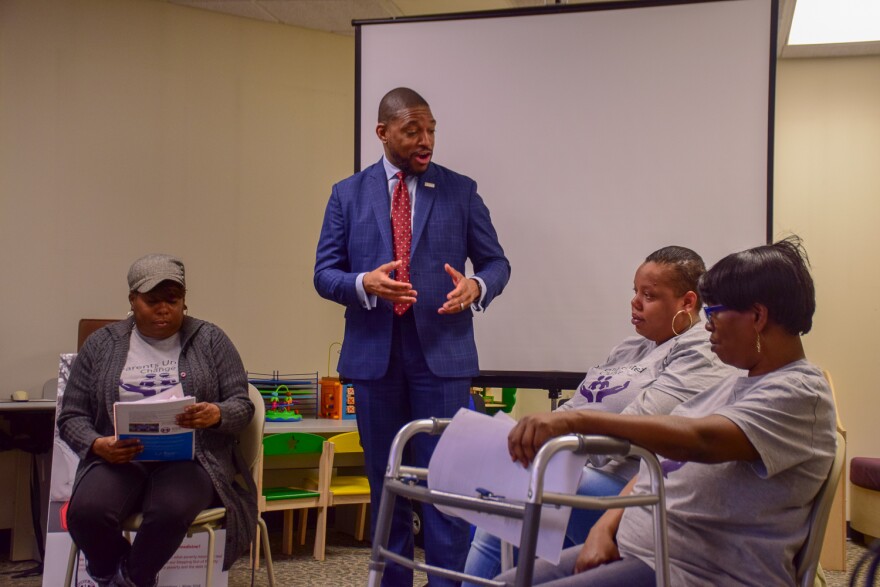Low-income families who live in public housing in East St. Louis are burdened by hidden fees that keep them trapped in debt, according to a survey conducted by the Stepping Out of Poverty campaign.
To help families escape the escalating debts, a group of East St. Louis parents is fighting the housing authority fees they say prevent families from moving and keep people impoverished. Parents United for Change have met with the East St. Louis Housing Authority to negotiate new policies that would limit the fees.
The parents have asked the housing authority to lower late rent fees from $50 to $5; to eliminate maintenance fees for washer-dryer access, freezers and window air units; and to eliminate a $25 yard clean-up fee.
Lettie Hicks, a member of Parents United for Change, said that when she spent several months in a medically induced coma and had a friend pay her rent, the landlord overcharged her, charged late fees and never reimbursed the extra fees.

Despite the extra fees, residents have trouble getting their landlords to complete maintenance tasks, said Yolanda Wooten, who lives in the Roosevelt Homes public housing complex. Wooten said she’s asked the housing authority to fix her furnace for months but no work has been done.
Wooten and Hicks are among several Parents United for Change members who have met housing authority officials to push for policy changes.
The utility charges are “minimal and reasonable,” said East St. Louis Housing Authority Executive Director Mildred Motley. But the housing authority is considering decreasing the late fees.
Motley said the housing authority charges excess utility fees in Gompers, John Robinson, John DeShields and Roosevelt homes because the tenants do not pay electric and water bills. The fees “offset the costs of utility charges due to the usage of major appliances,” Motley wrote in an email.
Motley wrote that the late fees used to be lower, but were increased “due to the high volume of residents that don’t pay their rent timely.”
Residents say the fees and fines take up significant portions of their limited incomes.
Delbra Myles, 53, has lived in the same apartment at Roosevelt Homes for more than 20 years. On top of her monthly $177 in rent, she said she also pays $8 a month for washer-dryer access and $20 for air conditioning units in the summer. She knows that if she paid it would cost her an extra $50.

Myles said she cleans trash out of her yard every day, but if someone else leaves garbage, she’s charged $25.
But Myles said she and her son need air conditioning units to control their asthma, so those charges aren’t optional for her.
“How am I supposed to get ahead when I’m supposed to pay all of this all the time?” she said. “It’s not a once-a-year thing. Every month, I got to pay the extra money just to use something I need.”
Myles said that if the housing authority addressed other maintenance concerns, she wouldn’t mind the fines. She waited two years for a repair to a rotten bathroom floor; her kitchen sink has been unusable since a pipe burst over the winter, and her water looks brown, she said.
Loading...
The housing authority fees and fines are among the charges that keep families from saving money, sending their kids to better schools and gaining economic mobility, said The Rev. Starksy Wilson, president of Deaconess Foundation, which advocates for racial equity.
“What we find now is a set of fines, fees, structured indebtedness that holds families back from wellbeing,” Wilson said. “It’s not just about money, it’s not just about fees, it’s not just about fines. It’s about the children that they hold back.”
The parents’ efforts are part of a larger initiative, the Stepping Out of Poverty Campaign for low-income families of color seeking policy changes that could reduce poverty and debt. Chicago-based POWER-PAC Illinois, a branch of Community Organizing and Family Issues, supports the initiative by training its members and coordinating its publicity.
The campaign surveyed 304 people in Illinois, including 48 from East St. Louis, and found that many low-income families reported they struggled to deal with monthly payments and longstanding debts.
The majority of respondents in the state said they couldn’t pay off their debt or even make the required payments. Almost half said the debt prevented them from making changes in their lives. Many said that looking at the combined costs of their monthly payments, they felt frustrated, overwhelmed, sad.
In East St. Louis, 90 percent of respondents said they had no savings. More than 70 percent reported having at least one debt. (A little over 61 percent of statewide respondents, or someone in their household, held paying jobs.)
To Hicks, who plans to continue negotiating with the housing authority, such policy changes are small steps that could give families a chance to save money and support their children’s futures.
“The only thing I’m trying to do is say, ‘Be sympathetic.’ This is low-income housing. We do stay in poverty areas,” she said. “Only thing I’m saying — just lower [the fees]. That’s all I wanna see.”
Follow Kae on Twitter: @kmaepetrin
Editor's note: An earlier version of this story misidentified a utility fee as a fine.



